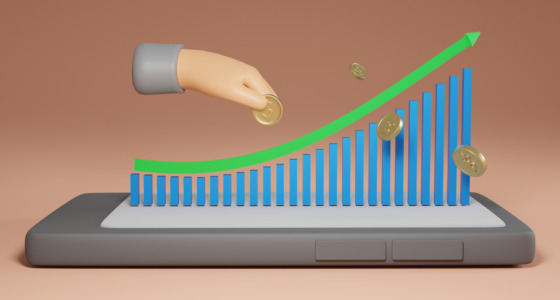

The importance of investment cannot be overstated. Warren Buffet is a name that everyone knows, but did you know that he made 99% of his wealth after he turned 50? Money sitting in your pocket loses its power thanks to inflation, so start investing if you want to put up a fight against inflation and increase your wealth.
How to start share market investments
Investing is a way to set aside a certain amount of money and have that money work for you, so that you can fully reap the rewards in the future. Investing is a means to a happier end. According to industry icon investor Warren Buffett. investing is “the process of laying out money now in the expectation of receiving more money in the future.” The goal of investing is to put your money to work in one or more types of investment vehicles in the hopes of growing your money over time.
What are the different means you can use to invest?
Let’s take a look at different ways to start your investment journey:
- Online brokers
Online trading for beginners can be an exciting venture. There are two types of online brokers; full-service and discount. Full-service brokers, as the name suggests, offer a wide range of traditional brokerage services, including but not limited to healthcare, retirement investment advice and other financial issues. They are suited for high net-worth individuals, since they usually charge a percentage per transaction, and there is a minimum investment threshold to use the services of these brokers. There are also discount brokers, who provide you with the tools to invest on your own. Online brokers used to be an exception, but now they are increasingly more popular among independent investors.
- Robo-advisors
Robo-advisors made a breakthrough on the investment scene after the 2008 financial crisis. Robo-advisors utilize the power of AI and machine learning to help you make investment decisions. Robo-advisors are getting better and better, as more data is becoming available for the algorithms to read and analyze.
- Employer-based investment
Share trading for beginners is certainly possible with the help of your employer. You can either buy the stocks of the company you work at or can contribute a set amount of your salary to the investment fund that your company offers. These investments are usually long-term and are aimed at securing a good retirement.
Short-term investments may be rather unpredictable, which is why many people look for long-term investments. That being said, you may find yourself 15 years after you started investing with a portfolio that did not perform as you expected.
For instance, if you are investing in a retirement account, this can delay your timeline for retirement. Unless you have realistic expectations for growth and a good strategy, you may find yourself way behind your investments.
3. You may have confidence blunders
Two things can happen if you are investing: you can either become overconfident or lose confidence as you go. Overconfidence is risky because it can cause you to invest much more than you should. You may go after a short-term gain only to realize a stock shifted on the day after. Confidence is good, but not when you make hasty decisions because of it.
On the other hand, having too little confidence can also affect you. For example, if you fall into a down market, you may find your confidence wavering, leading to losses. To save your assets, you may be tempted to liquidate everything. It’s important to stay confident that a recovery will follow, especially if it’s in a market that usually performs well.
How do commissions and fees work?
Economists have a saying, and that’s “There’s no such thing as a free lunch.” Every broker needs to make money from their customers in some way. For the most part, they will charge a commission for every trade that you make. Depending on the broker, you may end up paying around $10 per trade.
Because of these costs, most investors find it a good idea to limit how many trades they make in a day. This way, they avoid spending unnecessary money on these commissions. Some investment types also carWhat is the difference between a full-service and a discount broker?
Full-service brokers and discount brokers have their own advantages and drawbacks. As its name suggests, a full-service broker will offer a full package of financial services. This includes advice for education, healthcare, retirement, investment resources, and more. Because they deal with significant investments, they are often chosen by people with a high net worth and money to spare.
Discount brokers also offer plenty of services, but the threshold for access is lower. This means that if you are a beginner investor with a lower starting budget, you will not be limited by your finances. The sets of services are also much more streamlined, and you have the option of placing your own trades. This may help lower the commissions that you pay to the broker.

What are the risks of investing?
Investing comes with a fair amount of risk that you need to be aware of. Here are the most common ones:
1. Securities can lose value
If you need to liquidate, there is a good chance that your securities may lose value. Stock prices are rather volatile, and nothing can stop that. This can happen temporarily, in which case the stock price can rebound. If you cannot postpone your sale, then you may be in for some loss.
2. Portfolios can underperform
ry extra fees that cover the management of your account (i.e., exchange-traded funds).
What are the costs associated with opening an investment account?

Before you learn how to trade trading in share market there are certain expenses associated with trading that you should keep in mind, and the typical outlays are as follows:
- Minimum deposit amount
Most financial institutes that offer investment services often have a minimum deposit requirement. Today, you can start investing with as little as $1000. Don’t forget to check the reviews for every investment firm that you are considering, and only make the decision once you are 100% convinced that the company is legit and delivers on their promises. Apart from the minimum deposit amount, there are also trading fees and commission fees that you should be clear about before you start.
- Commissions and fees
There is no such thing as a free lunch, and this is especially true when it comes to investments. Though the brokers are racing to outcompete each other in terms of lowering their commissions and fees, there are still certain charges for the services offered by a brokerage firm. Trading fees can range anywhere from $2 to $10 per transaction. Some trade brokers don’t charge a trading fee, but they make up for it in other ways. If you don’t change your trading positions too often, trading fees and commission shouldn’t be a big concern.
- Mutual fund loads
If you decide to invest in mutual funds, apart from commission and trading fees, there are certain extra costs associated with them. Mutual funds are a type of funds that are professionally managed in a focused manner, i.e., investing in large-cap U.S stocks. Management Expense Ratio (MER) is an important fee charged when investing in mutual funds. MER ranges anywhere from 0.05% to .07% of your total investment, but higher the MER, higher the chances of making better returns. Sales Charges commonly known as loads are another cost associated with these investments.
What steps can I take to minimize the risks associated with trading?
The share market for beginners is not totally risk-free, no matter how smart your strategy is. However, there are certain things that you can do to minimize your risks in case of an unfavorable market movement. Here are a few things that you should keep in mind to reduce your risk of financial loss:
- Diversification is the key
“Don’t put all your eggs in one basket” is an old proverb commonly associated with investments, and indeed, it’s simple yet solid advice. It is never recommended that you put all your funds in one asset. Always try to diversify your investment by investing in different types of assets. When it comes to stocks, diversification can be especially tough. If you open more than one account and pay a minimum of $1000 on each account as a minimum deposit, it comes out to a substantial sum of money. This is where ETFs and mutual funds come in, because they are usually low-risk, and if you are starting with a small fund, they can be a perfect investment to lower the associated risks.
- Use stock market simulators
How to start share trading without putting your actual money at risk? Stock market simulators are the answer to this question. Today, there’s an incredible range of different market simulators available that replicate real-market trends and show whether your trading strategy is working. It’s a great idea for beginners to practice on simulators to see whether they can handle the market fluctuations.
The bottom line
Learning about stocks is very exciting if you are careful, and it is certainly possible to start investing without a huge sum of money. The key to successful investing is patience and panic control. Do your homework before putting your hard-earned money into any sort of investment fund. Also, be aware that you can lose, because trading is not risk-free, so never risk all you have, as tempting as it may seem. Now you know how to start share market business so what are you waiting for? Have a happy trading journey!







